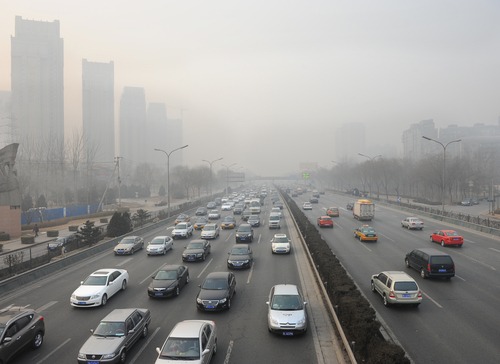It is impossible to avoid air pollution in urban areas. In fact, the WHO estimated that 92% of the world’s population lives in places where air quality levels exceed “WHO’s Ambient Air quality guidelines,” particularly with respect to the smallest particles, those with a diameter of less than 2.5 micrometers (PM2.5). These particles are considered to be the most hazardous, as they can penetrate deep into the lungs, pass to the bloodstream and cause severe cardiovascular, cerebrovascular and respiratory damage.
It has been known for many years that individuals who live in cities have an increased risk of heart disease, stroke, cancer, and even mental health problems. But also, recent studies reveal that air pollution makes us more susceptible to obesity and metabolic syndrome; that is, it can also make us fat.
For instance, longitudinal studies have shown that increased near-roadway air pollution exposure is associated with substantially increased body mass index in 10-18-year olds. Also, exposure to air pollutants in utero and during infancy increases the risk of abnormal glucose metabolism and obesity in later childhood (1, 2).
Wei Y. and collaborators analyzed the effects of air pollution on laboratory rats, reporting increased body weight and metabolic dysfunctions (higher total and LDL cholesterol, triglycerides and insulin resistance; which are indicators for type 2 diabetes), after 3-8 weeks of exposure to Beijing’s highly polluted air compared with their clean air-breathing counterparts (3). The hypothesis is that air pollution can induce oxidative stress and systemic inflammation, where fat tissue inflammation and insulin resistance induced obesity.
These findings are further proof of the damaging effect of air pollution on our health, and the urgent need to take ameliorating measures. But, in the meantime, we can take some measures that help us to be less exposed and to combat its effects. We can reduce our exposure, such as avoiding driving in areas with heavy traffic, and where possible to walk or cycle in quieter roads. Also, there are several apps that can track the air quality in our surroundings, which are very useful to help locate areas with better quality of air that are near to you.
Furthermore, a diet rich in antioxidants, such as the Mediterranean diet or by taking certain antioxidant food supplements, could lessen the harmful effects of air pollution. There is increasing evidence suggesting that carotenoids, vitamin D and vitamin E help protect against pollution damage, which can trigger asthma and increase the risk of lung cancer. Vitamin C, curcumin, choline, and omega-3 fatty acids and other plant polyphenols may also have a protective role.
Nuria Caturla
New Product Development Manager
References
- McConnell R et al. A longitudinal cohort study of body mass index and childhood exposure to second hand tobacco smoke and air pollution: the Southern California Children’s health study. Environ Health Perspect. 2015;123(4):360–6.
- Jerrett M et al. Automobile traffic around the home and attained body mass index: a longitudinal cohort study of children aged 10-18 years. Prev Med. 2010;50 (Suppl 1):S50–8.
- Wei Y et al. Chronic exposure to air pollution particles increases the risk of obesity and metabolic syndrome: findings from a natural experiment in Beijing. FASEB J.2016 Jun;30(6):2115-22.


